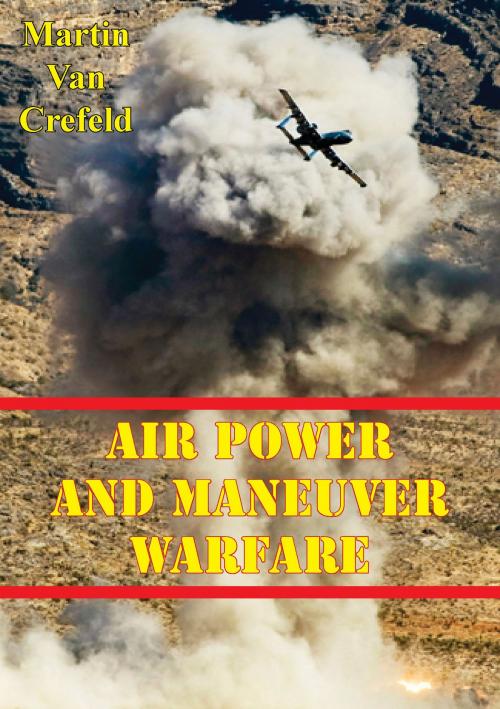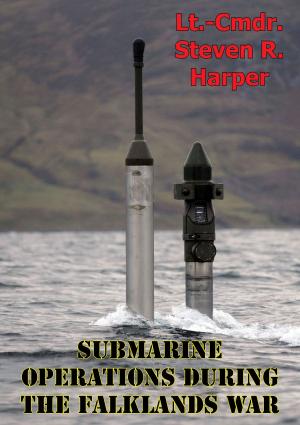| Author: | Professor Martin Van Crefeld | ISBN: | 9781782899921 |
| Publisher: | Tannenberg Publishing | Publication: | November 6, 2015 |
| Imprint: | Tannenberg Publishing | Language: | English |
| Author: | Professor Martin Van Crefeld |
| ISBN: | 9781782899921 |
| Publisher: | Tannenberg Publishing |
| Publication: | November 6, 2015 |
| Imprint: | Tannenberg Publishing |
| Language: | English |
An essential part of the Air War College, Maxwell Air Force Base (AFB), Alabama, curriculum consists of the study of military history and specific campaigns. Distinguished military scholars often visit the college to discuss and explore issues with the faculty. Martin van Creveld was one of those distinguished scholars. He had previously been commissioned by the Air Staff to investigate the effects of the US Army’s move toward a more maneuver-oriented kind of warfare and the effect that move will have on the US Air Force role on the battlefield. The Air Staff was concerned about a host of issues: logistic support for a highly mobile force; friendly force confusion on huge, rapidly changing battlefields; close air support with or without air base support; and a host of other issues. The bottom line for the Air Force concerned several issues of great impact. First, Must air combat change because land combat is changing? and, Is the decisiveness of air power increasing geometrically to the point where the twenty-first century will find it is as decisive as ground power was in the twentieth century?
Our guest historian agrees that sophisticated, highly technical air and space developments may have made air power dominant on the conventional battlefield. The great exception, however, lies in the trend away from conventional to unconventional conflict. To Professor van Creveld, nation-states have lost the monopoly on the legitimate use of violence. To prepare for a conventional scenario is to prepare for the last war, not the next one. The possibility of more “Lebanons” is much higher than the likelihood of future “Iraqs.”
An essential part of the Air War College, Maxwell Air Force Base (AFB), Alabama, curriculum consists of the study of military history and specific campaigns. Distinguished military scholars often visit the college to discuss and explore issues with the faculty. Martin van Creveld was one of those distinguished scholars. He had previously been commissioned by the Air Staff to investigate the effects of the US Army’s move toward a more maneuver-oriented kind of warfare and the effect that move will have on the US Air Force role on the battlefield. The Air Staff was concerned about a host of issues: logistic support for a highly mobile force; friendly force confusion on huge, rapidly changing battlefields; close air support with or without air base support; and a host of other issues. The bottom line for the Air Force concerned several issues of great impact. First, Must air combat change because land combat is changing? and, Is the decisiveness of air power increasing geometrically to the point where the twenty-first century will find it is as decisive as ground power was in the twentieth century?
Our guest historian agrees that sophisticated, highly technical air and space developments may have made air power dominant on the conventional battlefield. The great exception, however, lies in the trend away from conventional to unconventional conflict. To Professor van Creveld, nation-states have lost the monopoly on the legitimate use of violence. To prepare for a conventional scenario is to prepare for the last war, not the next one. The possibility of more “Lebanons” is much higher than the likelihood of future “Iraqs.”

![Cover of the book Between The Rivers: Combat Action In Iraq, 2003-2005 [Illustrated Edition] by Professor Martin Van Crefeld](https://www.kuoky.com/images/2014/august/300x300/9781782894926-MGVC_300x.jpg)




![Cover of the book Strategy For Defeat: The Luftwaffe, 1933-1945 [Illustrated Edition] by Professor Martin Van Crefeld](https://www.kuoky.com/images/2015/november/300x300/9781786257703-egzS_300x.jpg)





![Cover of the book Scouts Out! The Development Of Reconnaissance Units In Modern Armies [Illustrated Edition] by Professor Martin Van Crefeld](https://www.kuoky.com/images/2014/august/300x300/9781782899129-W8Ew_300x.jpg)

![Cover of the book Amicicide: The Problem Of Friendly Fire In Modern War [Illustrated Edition] by Professor Martin Van Crefeld](https://www.kuoky.com/images/2015/november/300x300/9781786253705-WiuR_300x.jpg)
